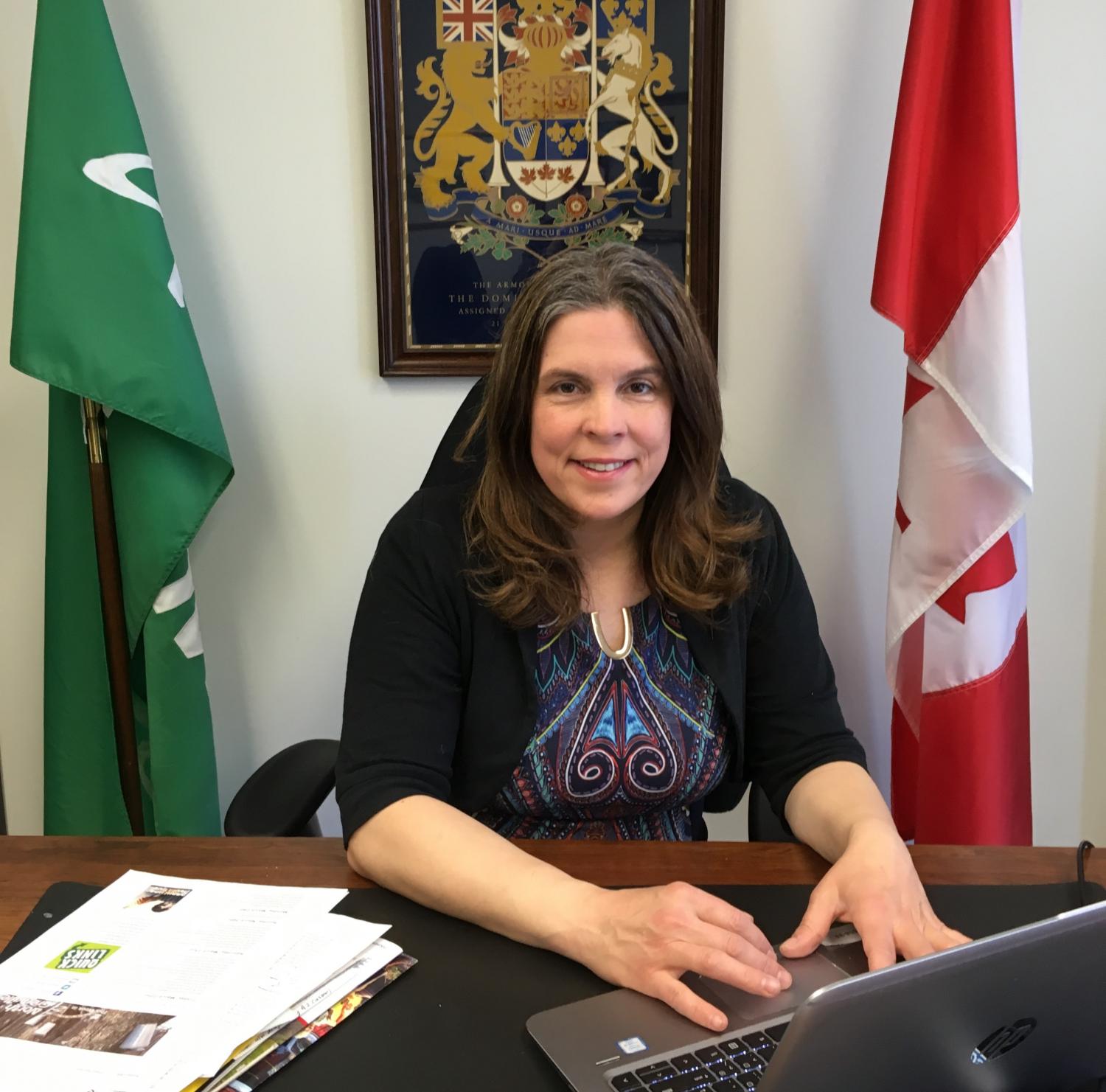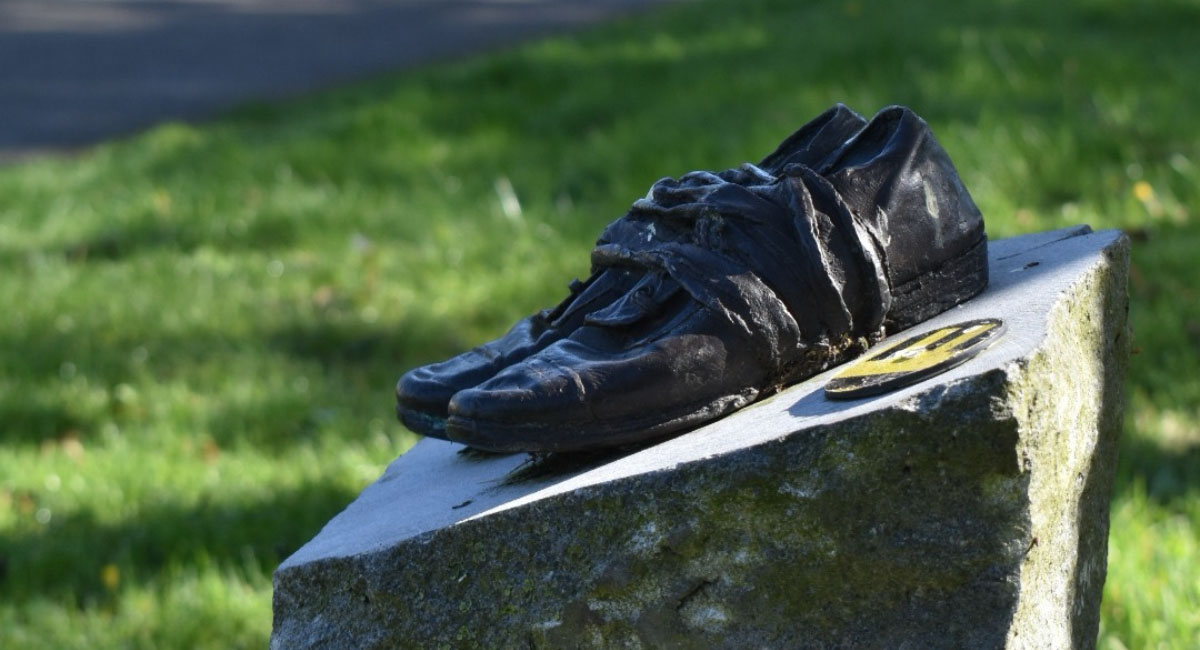
Nancy Peckford on political scene
Photo by Hilary Thomson
Nancy Peckford sits in a McDonalds in Kemptville, just outside Ottawa. It’s a warm evening in June and she has given up taking her three children to the park to focus on writing the proposal for what would be an unprecedented program in Canada. Sipping on coffee she funnels heart and soul into the application for funding Daughters of the Vote, an innovative program meant to encourage more women to run for office. The application would secure $500,000 in funding from Heritage Canada to support this innovative program aimed at inspiring young women to run for office.
Peckford’s passion for making a difference began at a young age. Growing up in Newfoundland her family moved around a lot for her father’s job. He was a federal civil servant and was often posted in small communities in transition, where their economies were evolving or even in crisis. “I didn’t have your typical Newfoundland experience of growing up in one town and being there all my life,” she says. Growing up Peckford also had the influence of her uncle, Brian Peckford, who was the Premier of Newfoundland for a decade from 1979 to 1989. “I didn’t get a lot of opportunities to spend time with him because, obviously, he was quite busy,” she remembers. “But we would see him a couple times a year and I would notice what he was doing through the newspapers and radio.”
Peckford was inspired by her uncle’s passion for the province and his commitment to making a difference. Brian Peckford worked tirelessly to bolster Newfoundland’s natural resource sector including offshore oil, fisheries and hydroelectric developments. He was instrumental in negotiating the Atlantic Accord with the Mulroney government in 1985 which granted Newfoundland and Labrador significant decision-making powers and financial benefits when it came to the province’s offshore energy resources. The Accord is considered one of the great successes of the Peckford administration and a turning point for the economy of Newfoundland and Labrador. “His capacity to work with other levels of government and to collaborate well with the Mulroney government was really significant to my understanding of how politics could be an effective vehicle for change,” Peckford says. “That you could really make a change in people’s lives.”
Peckford ended up getting a scholarship to a liberal arts college in the US. While she did most of her undergraduate studies there, she did a one year away program at Queens University where she immersed herself in Canadian political studies and Canadian political economy. “I had the choice of either going to Paris or Kingston and I chose Kingston,” she says laughing. “It was a fantastic year and it was definitely the right decision. I really missed Canada.”
After graduation Peckford decided that she wanted to return to Newfoundland and did her masters in sociology and anthropology at Memorial University in St. Johns. It was during her master’s program that she became involved in student government and served as the president of the graduate student’s union in the last year and a half of her degree. “There was an underservicing of graduate students, so I became quite involved in advocating for them,” she says.
Her student activism led her to accept a year-long internship run by the Canadian Political Science Association called the Canadian Parliamentary Internship Program. The internship selects ten outstanding Canadians with an undergraduate degree to serve on Parliament Hill. It is a unique program in that interns get the opportunity to work with MPs from both sides of the house. “It’s multi-partisan,” Peckford says. “Half a year is spent with an MP in government and half is spent with an MP in opposition.”
Even though the internship was only a year Peckford says it was instrumental in her education about how the Parliament of Canada functions. Her governing house placement was with Liberal MP Susan Whelan and her opposition placement was with a member of the then Reform Party, Bob Mills. “Of the two, I learned the most from Bob,” Peckford says. “He was opinionated but quite respectful and really interested in making a difference.” A businessman from Alberta, Bob was very motivated to run under the banner of the Reform Party which was trying to bring more representation to the West and shake up the political sphere. “Walking up the steps of centre block everyday was a really neat experience,” Peckford says. “To work with an MP from a party that saw itself as an outsider and seeking to do politics differently was really interesting.”
The internship gave Peckford the opportunity to travel overseas to see how governments worked in other countries. They also spent time at the provincial legislatures in Ontario and Quebec. “The mandate of the program is to give interns a really good sense of Canada’s political system and how it compares to some other European systems,” she says.
After her formative year on the Hill, Peckford knew she wanted to stay in Ottawa and became interested in the not-for-profit sector. She was hired on in a research position with the National Association of Women and the Law (NAWL), a leading think tank that examined how different pieces of legislation were affecting women country-wide. Once the leaders of the organization realized that she had political experience they gave her the job of liaising with influential politicians on the Hill. “What they really needed was a way to build bridges with parliamentarians,” Peckford says. “They would develop analysis that was really great, but they didn’t know how to translate that analysis into conversations with elected officials and policy-makers.”
Peckford spent her time with NAWL building these bridges and eventually acting as the lead lobby coordinator for a campaign the organization was involved with around poverty and violence. “I was able to be the intermediary between the coalition of not-for-profit organizations and parliament,” Peckford says, adding that she was able to secure meetings with leading MPs like then Finance Minister Paul Martin.
After a year and a half Peckford decided that if she was going to survive on the Hill she needed to learn more French. She took three months to head to the University of Laval where they had a French program designed specifically for anglophones. “It was a brilliant program,” she says. “I came back with much better French and more confidence.”
Wanting to stay in the not-for-profit sector and maintain her relationship with Parliament Hill, Peckford accepted a job with a coalition of women’s and human rights groups which focused on analyzing how the Canadian government was implementing its international human rights treaties. For five years she worked very closely with parliamentarians across party lines who had a specific interest in advancing international covenants. She also travelled to Geneva and New York to speak at the UN about how the not-for-profit sector understood how these treaties could be implemented in the larger context. “The UN is really structured to allow lots of not-for-profit engagement,” she says. “NGOs are there to influence their countries.”
Peckford says her experience working internationally with an NGO was awesome, but after having her first child she was looking for something that didn’t involve as much travel. Enter Equal Voice. In 2009 the small organization was looking for a new Executive Director and the position, which involved furthering the organization’s mission to bring more women into the political sphere, was right up her alley. “Our goal as a multi-partisan organization was to work with all major parties to find ways for them to recruit more women to the ballot,” Peckford says. “It was a fascinating world of never being partisan and being highly supportive of all parties.”
As Equal Voice’s Executive Director Peckford not only grew the organization but was also instrumental in the creation of a program that brought a total of 338 politically-inclined females to Parliament Hill. Peckford credits long-time MPP Lisa McLeod for spearheading the idea of doing something to celebrate not only Canada’s 150 anniversary in 2017, but also the 100th anniversary of women starting to get the vote in Canada. “Lisa said we have to do something,” Nancy remembers. “We have to mark the moment.”
And so, Peckford came up with the idea of bringing a young woman from every federal riding in the country to Parliament Hill. They called it Daughters of the Vote. It was one of the only political programs dedicated to young women and the only program in general that had delegates sitting in their MP’s seat while parliament was in session. “A lot of programs happen in non-sitting weeks,” Peckford says. “All these emerging leaders, young women and men, come to the Hill and it’s empty! Why would you do that?” She exclaimed passionately.
Through the Canadian Heritage grant and a lot of fundraising Equal Voice was able bring 338 young women to Parliament Hill on March 8, 2017; International Women’s Day. The women, ages 18-23, got to spend time with their MPs, sit in their seat and hear presentations from all the party leaders including Canada’s first and only female prime minister, Kim Campbell. Thirty of the delegates were also selected to make a one minute-speech to the house full of women on an issue that was important to them. “It was very multi-partisan,” Peckford says. “[Equal Voice] was an organization that was very committed to multi-partisanship.” Daughters of the Vote was named by CTV as one of 2017’s most memorable moments in the house of commons.
In 2011, Peckford made the decision to escape the big city in favour of a quieter life in rural North Grenville. “I was pregnant with my third child and my partner was like ‘let’s get out of town’,” she remembers. Having lived in small towns growing up, Peckford says she liked the idea of living in a smaller community and being more connected to neighbours and local business leaders, which is something that is often difficult in the big city. Living in downtown core of North Grenville (Kemptville) Peckford became involved in issues that mattered to her as a resident and parent. She got her first taste of politics at the municipal level when she became part of a group that lobbied council to revitalize one of the municipality’s main parks. “Through that effort I got to know the municipal governance structure a little bit better and felt the needs of residents weren’t always being well met,” she says. “I thought to myself that one day maybe I’ll run for council.”
Not only did Peckford run for council, she ran for Mayor. And won. On October 22, 2018, after running an energetic, forward-thinking campaign Nancy Peckford became North Grenville’s first female mayor.
Peckford says winning the election was a bit surreal. She says that when she filed her papers to run, she had no idea what the outcome would be. “I felt that my commitment to myself and my community was to run a really vigorous campaign and reflect the needs of the community through my campaign,” she says. “Even if I didn’t [win] I would have made a contribution regardless and I would have strengthened my relationships in the community.”
Unlike many politicians, Peckford views her contribution as Mayor of North Grenville as a long-game. She says she learned from watching her Uncle Brian in Newfoundland fight tirelessly to support the oil and gas industry that only really started to contribute to the economy years after he left office. “These things take time, but I think that with good leadership and effective representation and team work it can be done,” she says. “I’m very acutely aware that the impact I have will be felt 20 years done the road as much as it will be felt five years down the road.”
As the mayor of one of Eastern Ontario’s fastest growing communities Peckford hopes to focus on sustainable growth and quality of life for the residents of North Grenville. “I would hope to have a legacy of responsible and sustainable growth where the quality of life in this community isn’t compromised but enhanced,” she says.
Peckford is aware that there are many difficult issues that will need to be address in North Grenville in the coming years. From accessible transportation, to affordable housing, to creating a cohesive and thriving community as it grows, Peckford is adamant that with hard work and innovative thinking there are always solutions to be found. “I think my uncle’s legacy is defined as not giving up,” she says. “If you don’t win them all that’s ok but at least you did justice to it. I feel very strongly about that.”












